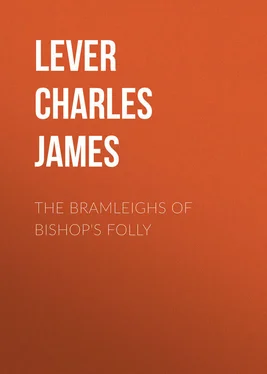Charles Lever - The Bramleighs of Bishop's Folly
Здесь есть возможность читать онлайн «Charles Lever - The Bramleighs of Bishop's Folly» — ознакомительный отрывок электронной книги совершенно бесплатно, а после прочтения отрывка купить полную версию. В некоторых случаях можно слушать аудио, скачать через торрент в формате fb2 и присутствует краткое содержание. Издательство: Иностранный паблик, Жанр: literature_19, foreign_antique, foreign_prose, на английском языке. Описание произведения, (предисловие) а так же отзывы посетителей доступны на портале библиотеки ЛибКат.
- Название:The Bramleighs of Bishop's Folly
- Автор:
- Издательство:Иностранный паблик
- Жанр:
- Год:неизвестен
- ISBN:нет данных
- Рейтинг книги:4 / 5. Голосов: 1
-
Избранное:Добавить в избранное
- Отзывы:
-
Ваша оценка:
- 80
- 1
- 2
- 3
- 4
- 5
The Bramleighs of Bishop's Folly: краткое содержание, описание и аннотация
Предлагаем к чтению аннотацию, описание, краткое содержание или предисловие (зависит от того, что написал сам автор книги «The Bramleighs of Bishop's Folly»). Если вы не нашли необходимую информацию о книге — напишите в комментариях, мы постараемся отыскать её.
The Bramleighs of Bishop's Folly — читать онлайн ознакомительный отрывок
Ниже представлен текст книги, разбитый по страницам. Система сохранения места последней прочитанной страницы, позволяет с удобством читать онлайн бесплатно книгу «The Bramleighs of Bishop's Folly», без необходимости каждый раз заново искать на чём Вы остановились. Поставьте закладку, и сможете в любой момент перейти на страницу, на которой закончили чтение.
Интервал:
Закладка:
“I’ve no doubt of it,” said he, gravely. “Frenchmen are vastly more gallant than we are.”
“Do you know, Jack,” said she again, “he is most amusing?”
“Very probably.”
“And has such a perfect accent; that sort of purring French one only hears from a Parisian?”
“I am charmed to hear it.”
“It charmed me to hear it, I assure you. One does so long for the sounds that recall bright scenes and pleasant people: one has such a zest for the most commonplace things that bring back the memory of very happy days.”
“What a lucky Frenchman to do all this!”
“What a lucky Irish girl to have met with him!” said she, gayly.
“And how did you come to know him, may I ask?”
“George had been several times over to inquire after him, and out of gratitude Count Pracontal, – I am not sure that he is count though, but it is of no moment, – made it a point to come here the first day he was able to drive out. Mr. Longworth drove him over in his pony carriage, and George was so pleased with them both that he asked them to tea last evening, and they dine here to-day.”
“Hence these decorations?”
“Precisely.”
“What a brilliant neighborhood we have! And there are people will tell you that this is all barbarism here.”
“Come over this evening, Jack, and hear M. Pracontal sing – he has a delicious tenor voice – and you ‘ll never believe in that story of barbarism again. We had quite a little ‘salon’ last night.”
“I must take your word for his attractive qualities,” said Jack, as his brow contracted and his face grew darker. “I thought your brother rather stood aloof from Mr. Longworth. I was scarcely prepared to hear of his inviting him here.”
“So he did; but he found him so different from what he expected – so quiet, so well-bred, that George, who always is in a hurry to make an ‘amende’ when he thinks he has wronged any one, actually rushed into acquaintance with him at once.”
“And his sister Julia,” asked Jack, with a look of impertinent irony, “was she, too, as impulsive in her friendship?”
“I think pretty much the same.”
“It must have been a charming party.”
“I flatter myself it was. They stayed till midnight; and M. Pracontal declared he’d break his other leg to-morrow if it would ensure him another such evening in his convalescence.”
“Fulsome rascal! I protest it lowers my opinion of women altogether when I think these are the fellows that always meet their favor.”
“Women would be very ungrateful if they did not like the people who try to please them. Now, certainly, as a rule, Jack, you will admit foreigners are somewhat more eager about this than you gentlemen of England.”
“I have about as much of this as I am likely to bear well from my distinguished stepmother,” said he, roughly, “so don’t push my patience further.”
“What do you say to our little ‘salon’ now?” said she. “Have you ever seen ferns and variegated ivy disposed more tastefully?”
“I wish – I wish” – stammered he out, and then seemed unable to go on.
“And what do you wish?”
“I suppose I must not say it. You might feel offended besides.”
“Not a bit, Jack. I am sure it never could be your intention to offend me, and a mere blunder could not do so.”
“Well, I ‘ll go round and tell you what it is I wish,” and with this he entered the house and passed on into the drawing-room, and taking his place at one side of the fire, while she stood at the other, said seriously, “I was wishing, Julia, that you were less of a coquette.”
“You don’t mean that?” said she, roguishly, dropping her long eyelashes, as she looked down immediately after.
“I mean it seriously, Julia. It is your one fault; but it is an immense one.”
“My dear Jack,” said she, very gravely, “you men are such churls that you are never grateful for any attempts to please you except they be limited strictly to yourselves. You would never have dared to call any little devices, by which I sought to amuse or interest you, coquetry, so long as they were only employed on your own behalf. My real offence is that I thought the world consisted of you and some others.”
“I am not your match in these sort of subtle discussions,” said he, bluntly, “but I know what I say is fact.”
“That I’m a coquette?” said she, with so much feigned horror that Jack could scarcely keep down the temptation to laugh.”
“Just so; for the mere pleasure of displaying some grace or some attraction, you ‘d half kill a fellow with jealousy, or drive him clean mad with uncertainty. You insist on admiration – or what you call ‘homage,’ which I trust is only a French name for it – and what’s the end of it all? You get plenty of this same homage; but – but – never mind. I suppose I’m a fool to talk this way. You ‘re laughing at me besides, all this while. I see it – I see it in your eyes.”
“I was n’t laughing, Jack, I assure you. I was simply thinking that this discovery – I mean of my coquetry – was n’t yours at all. Come, be frank and own it. Who told you I was a coquette, Jack?”
“You regard me as too dull-witted to have found it out, do you?”
“No, Jack. Too honest-hearted – too unsuspecting, too generous, to put an ill construction where a better one would do as well.”
“If you mean that there are others who agree with me, you’re quite right.”
“And who may they be?” asked she, with a quiet smile. “Come, I have a right to know.”
“I don’t see the right.”
“Certainly I have. It would be very ungenerous and very unjust to let me continue to exercise all those pleasing devices you have just stigmatized for the delectation of people who condemn them.”
“Oh, you could n’t help that. You’d do it just to amuse yourself, as I ‘m sure was the case yesterday, when you put forth all your captivations for that stupid old Viscount.”
“Did I?”
“Did you? You have the face to ask it?”
“I have, Jack. I have courage for even more, for I will ask you, was it not Marion said this? Was it not Marion who was so severe on all my little gracefulnesses? Well, you need not answer if you don’t like. I ‘ll not press my question; but own, it is not fair for Marion, with every advantage, her beauty and her surroundings – ”
“Her what?”
“Well, I would not use a French word; but I meant to say, those accessories which are represented by dress, and ‘toilette’ – not mean things in female estimation. With all these, why not have a little mercy for the poor curate’s sister, reduced to enter the lists with very uncouth weapons?”
“You won’t deny that Ellen loves you?” said he, suddenly.
“I ‘d be sorry, very sorry, to doubt it; but she never said I was a coquette?”
“I ‘m sure she knows you are,” said he, doggedly.
“Oh, Jack, I hope this is not the way you try people on court-martial?”
“It’s the fairest way ever a fellow was tried; and if one does n’t feel him guilty he ‘d never condemn him.”
“I ‘d rather people would feel less, and think a little more, if I was to be ‘the accused,’” said she, half pettishly.
“You got that, Master Jack; that round shot was for you ,” said he, not without some irritation in his tone.
“Well,” said she, good-humoredly, “I believe we are firing into each other this morning, and I declare I cannot see for what.”
“I ‘ll tell you, Julia. You grew very cross with me, because I accused you of being a coquette, a charge you ‘d have thought pretty lightly of if you had n’t known it was deserved.”
“Might there not have been another reason for the crossness, supposing it to have existed?” said she, quietly.
Читать дальшеИнтервал:
Закладка:
Похожие книги на «The Bramleighs of Bishop's Folly»
Представляем Вашему вниманию похожие книги на «The Bramleighs of Bishop's Folly» списком для выбора. Мы отобрали схожую по названию и смыслу литературу в надежде предоставить читателям больше вариантов отыскать новые, интересные, ещё непрочитанные произведения.
Обсуждение, отзывы о книге «The Bramleighs of Bishop's Folly» и просто собственные мнения читателей. Оставьте ваши комментарии, напишите, что Вы думаете о произведении, его смысле или главных героях. Укажите что конкретно понравилось, а что нет, и почему Вы так считаете.












